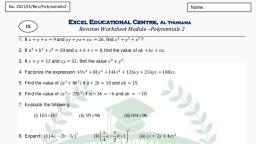Question 1 :
If {tex} z = 3 / ( 2 + \cos \theta + i \sin \theta ) , {/tex} then locus of {tex} z {/tex} is
Question 2 :
If a ∈ (-1, 1), then roots of the quadratic equation (a - 1) x<sup>2</sup> + ax + <img style='object-fit:contain' src='https://storage.googleapis.com/teachmint/question_assets/JEE%20Main/5e74642d4b0dee6204206930' height='25' width='45' > = 0 are -<br>
Question 3 :
If {tex} \left| z _ { 1 } \right| = \left| z _ { 2 } \right| = \left| z _ { 3 } \right| = 1 {/tex} and {tex} z _ { 1 } + z _ { 2 } + z _ { 3 } = 0 , {/tex} then area of the triangle whose vertices are {tex} z _ { 1 } , z _ { 2 } , z _ { 3 } {/tex} is
Question 4 :
If 6<sup>x</sup> + 6<sup>x+1</sup> = 2<sup>x </sup>+ 2<sup>x+1</sup> + 2<sup>x+2 </sup>the number of solutions of x is-<br>
Question 5 :
If {tex} c > 0 {/tex} and {tex} 4 a + c < 2 b , {/tex} then {tex} a x ^ { 2 } - b x + c = 0 {/tex} has a root in the interval
Question 6 :
If the sum of the roots of the quadratic equation {tex} a x ^ { 2 } + b x + c = 0 {/tex} is equal to the sum of the squares of their reciprocals, then {tex} \frac { a } { c } , \frac { b } { a } {/tex} and {tex} \frac { c } { b } {/tex} are in
Question 7 :
The solution set of <img style='object-fit:contain' src='https://storage.googleapis.com/teachmint/question_assets/JEE%20Main/5e74642ecae19162cd5e25e9' height='41' width='36' > + |x| = <img style='object-fit:contain' src='https://storage.googleapis.com/teachmint/question_assets/JEE%20Main/5e74642eaed3b36285244876' height='41' width='41' > is :<br>
Question 8 :
If {tex} p {/tex} and {tex} q {/tex} are the roots of the equation {tex} x ^ { 2 } + p x + q = 0 , {/tex} then
Question 9 :
If {tex} 8 i z ^ { 3 } + 12 z ^ { 2 } - 18 z + 27 i = 0 , {/tex} then
Question 10 :
If {tex} z ^ { 2 } + z + 1 = 0 , {/tex} where {tex} z {/tex} is a complex number, then the value of {tex} \left( z + \frac { 1 } { z } \right) ^ { 2 } + \left( z ^ { 2 } + \frac { 1 } { z ^ { 2 } } \right) ^ { 2 } {/tex} {tex} + \left( z ^ { 3 } + \frac { 1 } { z ^ { 3 } } \right) ^ { 2 } + \ldots + \left( z ^ { 6 } + \frac { 1 } { z ^ { 6 } } \right) ^ { 2 } {/tex} is
Question 11 :
If {tex} | z + 4 | \leq 3 , {/tex} then the maximum value of {tex} | z + 1 | {/tex} is
Question 12 :
If {tex} \omega ( \neq 1 ) {/tex} is a cube root of unity, and {tex} ( 1 + \omega ) ^ { 7 } = A + B \omega . {/tex} Then {tex} ( A , B ) {/tex} equals
Question 13 :
If a, b, c ∈ R and 1 is a root of equation ax<sup>2</sup> + bx + c = 0, then equation 4ax<sup>2</sup> + 3bx + 2c = 0, c ≠ 0 has<br>
Question 14 :
If {tex} x + \frac { 1 } { x } = 1 , {/tex} then {tex} x ^ { 2000 } + \frac { 1 } { x ^ { 2000 } } {/tex} is equal to
Question 15 :
If the quadratic equations, 3x<sup>2</sup> + ax + 1 = 0 and <br>2x<sup>2</sup> + bx + 1 = 0 have a common root, then the value of the <br>expression 5ab -2a<sup>2</sup> -3b<sup>2</sup> is: <br>
Question 16 :
The equation <img style='object-fit:contain' src='https://storage.googleapis.com/teachmint/question_assets/JEE%20Main/5e7463ef4b0dee62042068ac' height='35' width='15' >log (x<sup>2</sup> + 2x) - log <img style='object-fit:contain' src='https://storage.googleapis.com/teachmint/question_assets/JEE%20Main/5e7463d34b0dee6204206872' height='21' width='41' >= 0 has the solution -<br>
Question 17 :
Let {tex} C _ { 1 } {/tex} and {tex} C _ { 2 } {/tex} are concentric circles of radius {tex}1{/tex} and {tex} 8 / 3 , {/tex} respectively, having centre at {tex} ( 3,0 ) {/tex} on the Argand plane. If the complex number {tex} z {/tex} satisfies the inequality<br>{tex} \log _ { 1 / 3 } \left( \frac { | z - 3 | ^ { 2 } + 2 } { 11 | z - 3 | - 2 } \right) > 1 {/tex} then<br>
Question 18 :
Let a, b, c be three real numbers such that 2a + 3b + 6c = 0. Then the quadratic equation ax<sup>2</sup> + bx + c = 0 has -<br>
Question 19 :
The locus of point {tex} z {/tex} satisfying {tex} \operatorname { Re } \left( \frac { 1 } { z } \right) = k , {/tex} where {tex} k {/tex} is a non- zero real number, is
Question 20 :
For any complex number {tex} z , {/tex} maximum value of {tex} | z | - | z - 1 | {/tex} is
























